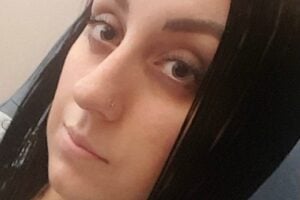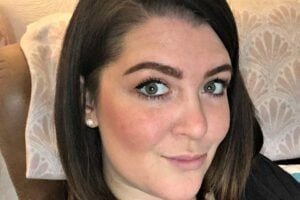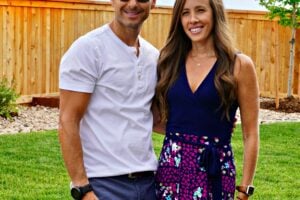Postscript: March 2021 Update
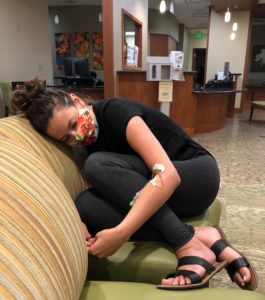 After recovery following my first blood clot, I thought it was all finally over. After suffering a debilitating stroke due to a blood clot in 2018, it never occurred to me that I could have another blood clot while on a blood thinner. Luckily, this time I knew the signs.
After recovery following my first blood clot, I thought it was all finally over. After suffering a debilitating stroke due to a blood clot in 2018, it never occurred to me that I could have another blood clot while on a blood thinner. Luckily, this time I knew the signs.
Eighteen months after my original blood clot scare resulting in a stroke, I began to feel warmth and throbbing pain in my forearm. By the end of the day, that “warm to the touch” sign or symptom of a blood clot actually became “hot to the touch,” and, thanks to what I had learned from the National Blood Clot Alliance website, I knew right away that I needed to seek medical care.
My husband and I were nervous to go to the ER during a global pandemic, but we also knew that this couldn’t wait. After my last blood clot nearly killed me, we couldn’t delay or make the same mistake this time. Left undiagnosed or untreated, we knew this situation could possibly lead to another ICU stay, but the quick trip we did make to the ER instead led to an arm scan that swiftly identified the clot in my arm, and, after a quick and painless procedure, I was again blood clot free.
While setbacks like these can be difficult to accept and manage, I always focus on the ways that I can take the lemons that life hands me and make some lemonade. Self-care is an important part of that life philosophy for me, and below I share some of my Personal Pearls of Self-Care Wisdom with the hope of helping others through the experience along the blood clot journey that so many of us share.
 Pearls of Self-Care Wisdom: Turning Lemons Into Lemonade
Pearls of Self-Care Wisdom: Turning Lemons Into Lemonade
- Schedule NO days. No days are where you have absolutely nothing scheduled for that day. When others ask if you can do something that day, even if it’s fun, stand strong in having at least two “NO” days a month. Spending a day doing absolutely nothing is essential for letting your mind rest.
- Learn to let go of toxic individuals/circumstances in your life. Sometimes self-care isn’t easy. Letting go of people, jobs, or relationships that cause unnecessary stress is essential to whole-body wellness.
- Plant a few seeds…literally, plant something. Do you know the happiness that comes from watching something grow? The simple satisfaction of watching something you started to grow while the world is in a stressful time allows for some hope and relief that things can and will get better.
- Practice gratitude. Grab a notebook! If you spend a few minutes in the morning and a few minutes before bed writing down three things you’re grateful for you might notice an increase in your overall mood as you begin to focus on the positive things in your life. Just like physical exercise, this mental health exercise might help to increase your serotonin levels and improve your mood.
- Allow yourself to have a bad day. Too many people try to “fix” bad days. Life will always ebb and flow, but what’s important is to practice gratitude even when it’s hard, and realize that tomorrow is a new day and a fresh start for a good day. It’s ok to feel bad, you do not always have to feel happy.
Original Story, Posted March 2019
I wish I would have listened to my own body. As a social worker, crisis therapist, and family advocate, I’m in the habit of happily listening nonstop to everyone else to address their concerns, often placing my own concerns on the back burner. On the day I suffered my stroke, it was the fourth day in a row I had a debilitating headache with neck pain, and I left work early that day. Later that evening, my husband and I were sitting on the couch together when all of a sudden I heard a loud pop in my head, followed by the sound of a sizzle that completely filled my head. I was terrified. I tried to tell my husband, but found that I physically could not move or speak at all. After about 10 very long seconds, I could finally gain control over my body again and attempted to speak. My words were real words, but incredibly jumbled up. I finally said “hospital,” and after making my way there and being evaluated, I was diagnosed with blood clots in my carotid artery and prefrontal cortex within an hour.
As the current Mrs. Ohio, I went from being on the Mrs. America stage as an advocate for people who could not speak for themselves, and holding a national press conference, to having a stroke just two weeks later that left me unable to speak, move, read, or write due to the blood clots in my neck and head.
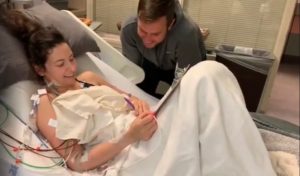
I spent two weeks in the ICU trapped inside of my own body, fully cognizant of everything around me, and yet unable to respond. I endured five brain procedures in an attempt to clear my carotid artery of the blood clot, all of which were unsuccessful. I have since spent the following weeks in intensive speech and occupational therapy learning how to speak, read, write, and spell again. All of this pain, fear, and anxiety could have been prevented, if I would have listened to my own body and realized that chronic headaches are not normal, or healthy.
All of this to say: Please take care of yourself first. Without being in your best shape, you cannot help anyone else, including yourself. Know the signs and symptoms of blood clots, and know that they do not discriminate. I am 30 years old and weigh 116 pounds. I do not have high blood pressure, I have never smoked, I do not have heart disease, or a history of a clotting disorder. I work out four or five times a week and eat healthy. The catalyst for my blood clots: I popped or stretched and manipulated my neck too much, attempting to alleviate the pressure and built up stress I felt while sitting at my desk at work. This popping caused a carotid artery dissection, resulting in blood clots being sent to my brain. Mistakenly, I didn’t seek medical help because I thought it was “just a headache,” and surely the doctors at the hospital would think that I was ridiculous. I’m here to tell you today that you are important enough to check on something, even if it is “just a headache.” Listen to your body. Your life is worth it.
MORE INFORMATION AND RESOURCES:
- Join our online peer support community to connect with other people who have experienced a blood clot.
- Read more about blood clot risks, signs and symptoms, and prevention.
- Read more stories, or share your story with NBCA.


